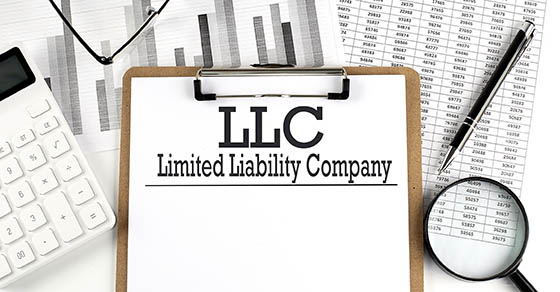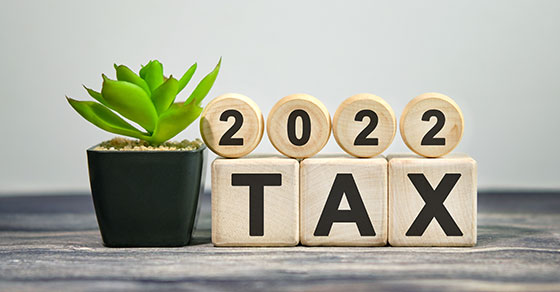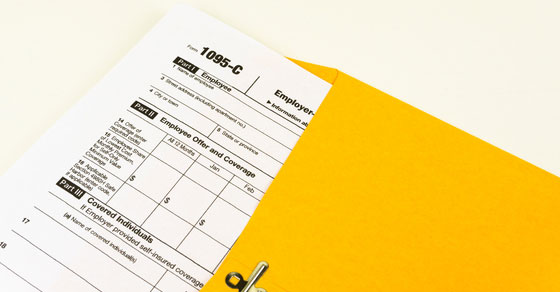Weekly Tax Brief
Is your income high enough to owe two extra taxes?
- Details
- Published: 09 September 2022 09 September 2022

High-income taxpayers face two special taxes — a 3.8% net investment income tax (NIIT) and a 0.9% additional Medicare tax on wage and self-employment income. Here’s an overview of the taxes and what they may mean for you.
3.8% NIIT
This tax applies, in addition to income tax, on your net investment income. The NIIT only affects taxpayers with adjusted gross income (AGI) exceeding $250,000 for joint filers, $200,000 for single taxpayers and heads of household, and $125,000 for married individuals filing separately.
If your AGI is above the threshold that applies ($250,000, $200,000 or $125,000), the NIIT applies to the lesser of 1) your net investment income for the tax year or 2) the excess of your AGI for the tax year over your threshold amount.
The “net investment income” that’s subject to the NIIT consists of interest, dividends, annuities, royalties, rents and net gains from property sales. Wage income and income from an active trade or business isn’t included. However, passive business income is subject to the NIIT.
Income that’s exempt from income tax, such as tax-exempt bond interest, is likewise exempt from the NIIT. Thus, switching some taxable investments to tax-exempt bonds can reduce your exposure. Of course, this should be done after taking your income needs and investment considerations into account.
How does the NIIT apply to home sales? If you sell your principal residence, you may be able to exclude up to $250,000 of gain ($500,000 for joint filers) when figuring your income tax. This excluded gain isn’t subject to the NIIT.
However, gain that exceeds the exclusion limit is subject to the tax. Gain from the sale of a vacation home or other second residence, which doesn’t qualify for the exclusion, is also subject to the NIIT.
Distributions from qualified retirement plans, such as pension plans and IRAs, aren’t subject to the NIIT. However, those distributions may push your AGI over the threshold that would cause other types of income to be subject to the tax.
Additional 0.9% Medicare tax
Some high-wage earners pay an extra 0.9% Medicare tax on part of their wage income, in addition to the 1.45% Medicare tax that all wage earners pay. The 0.9% tax applies to wages in excess of $250,000 for joint filers, $125,000 for a married individuals filing separately and $200,000 for all others. It applies only to employees, not to employers.
Once an employee’s wages reach $200,000 for the year, the employer must begin withholding the additional 0.9% tax. However, this withholding may prove insufficient if the employee has additional wage income from another job or if the employee’s spouse also has wage income. To avoid that result, an employee may request extra income tax withholding by filing a new Form W-4 with the employer.
An extra 0.9% Medicare tax also applies to self-employment income for the tax year in excess of the same amounts for wage earners. This is in addition to the regular 2.9% Medicare tax on all self-employment income. The $250,000, $125,000, and $200,000 thresholds are reduced by the taxpayer's wage income.
Reduce the impact
As you can see, these two taxes may have a significant effect on your tax bill. Contact us to discuss these taxes and how their impact could be reduced.
© 2022
Year-end tax planning ideas for your small business
- Details
- Published: 06 September 2022 06 September 2022

Now that Labor Day has passed, it’s a good time to think about making moves that may help lower your small business taxes for this year and next. The standard year-end approach of deferring income and accelerating deductions to minimize taxes will likely produce the best results for most businesses, as will bunching deductible expenses into this year or next to maximize their tax value.
If you expect to be in a higher tax bracket next year, opposite strategies may produce better results. For example, you could pull income into 2022 to be taxed at lower rates, and defer deductible expenses until 2023, when they can be claimed to offset higher-taxed income.
Here are some other ideas that may help you save tax dollars if you act before year-end.
QBI deduction
Taxpayers other than corporations may be entitled to a deduction of up to 20% of their qualified business income (QBI). For 2022, if taxable income exceeds $340,100 for married couples filing jointly (half that amount for others), the deduction may be limited based on: whether the taxpayer is engaged in a service-type business (such as law, health or consulting), the amount of W-2 wages paid by the business, and/or the unadjusted basis of qualified property (such as machinery and equipment) held by the business. The limitations are phased in.
Taxpayers may be able to salvage some or all of the QBI deduction by deferring income or accelerating deductions to keep income under the dollar thresholds (or be subject to a smaller deduction phaseout). You also may be able increase the deduction by increasing W-2 wages before year-end. The rules are complex, so consult us before acting.
Cash vs. accrual accounting
More small businesses are able to use the cash (rather than the accrual) method of accounting for federal tax purposes than were allowed to do so in previous years. To qualify as a small business under current law, a taxpayer must (among other requirements) satisfy a gross receipts test. For 2022, it’s satisfied if, during a three-year testing period, average annual gross receipts don’t exceed $27 million. Not that long ago, it was only $5 million. Cash method taxpayers may find it easier to defer income by holding off billings until next year, paying bills early or making certain prepayments.
Section 179 deduction
Consider making expenditures that qualify for the Section 179 expensing option. For 2022, the expensing limit is $1.08 million, and the investment ceiling limit is $2.7 million. Expensing is generally available for most depreciable property (other than buildings) including equipment, off-the-shelf computer software, interior improvements to a building, HVAC and security systems.
The high dollar ceilings mean that many small- and medium-sized businesses will be able to currently deduct most or all of their outlays for machinery and equipment. What’s more, the deduction isn’t prorated for the time an asset is in service during the year. Just place eligible property in service by the last days of 2022 and you can claim a full deduction for the year.
Bonus depreciation
Businesses also can generally claim a 100% bonus first year depreciation deduction for qualified improvement property and machinery and equipment bought new or used, if purchased and placed in service this year. Again, the full write-off is available even if qualifying assets are in service for only a few days in 2022.
Consult with us for more ideas
These are just some year-end strategies that may help you save taxes. Contact us to tailor a plan that works for you.
© 2022
Inflation Reduction Act provisions of interest to small businesses
- Details
- Published: 30 August 2022 30 August 2022

The Inflation Reduction Act (IRA), signed into law by President Biden on August 16, contains many provisions related to climate, energy and taxes. There has been a lot of media coverage about the law’s impact on large corporations. For example, the IRA contains a new 15% alternative minimum tax on large, profitable corporations. And the law adds a 1% excise tax on stock buybacks of more than $1 million by publicly traded U.S. corporations.
But there are also provisions that provide tax relief for small businesses. Here are two:
A payroll tax credit for research
Under current law, qualified small businesses can elect to claim a portion of their research credit as a payroll tax credit against their employer Social Security tax liability, rather than against their income tax liability. This became effective for tax years that begin after December 31, 2015.
Qualified small businesses that elect to claim the research credit as a payroll tax credit do so on IRS Form 8974, “Qualified Small Business Payroll Tax Credit for Increasing Research Activities.” Currently, a qualified small business can claim up to $250,000 of its credit for increasing research activities as a payroll tax credit against the employer's share of Social Security tax.
The IRA makes changes to the credit, beginning next year. It allows for qualified small businesses to apply an additional $250,000 in qualifying research expenses as a payroll tax credit against the employer share of Medicare. The credit can’t exceed the tax imposed for any calendar quarter, with unused amounts of the credit carried forward. This provision will take effect for tax years beginning after December 31, 2022.
A qualified small business must meet certain requirements, including having gross receipts under a certain amount.
Extension of the limit on excess business losses of noncorporate taxpayers
Another provision in the new law extends the limit on excess business losses for noncorporate taxpayers. Under prior law, there was a cap set on business loss deductions by noncorporate taxpayers. For 2018 through 2025, the Tax Cuts and Jobs Act limited deductions for net business losses from sole proprietorships, partnerships and S corporations to $250,000 ($500,000 for joint filers). Losses in excess of those amounts (which are adjusted annually for inflation) may be carried forward to future tax years under the net operating loss rules.
Although another law (the CARES Act) suspended the limit for the 2018, 2019 and 2020 tax years, it’s now back in force and has been extended through 2028 by the IRA. Businesses with significant losses should consult with us to discuss the impact of this change on their tax planning strategies.
We can help
These are only two of the many provisions in the IRA. There may be other tax benefits to your small business if you’re buying electric vehicles or green energy products. Contact us if you have questions about the new law and your situation.
© 2022
Home sweet home: Do you qualify for office deductions?
- Details
- Published: 25 August 2022 25 August 2022

If you’re a business owner working from home or an entrepreneur with a home-based side gig, you may qualify for valuable home office deductions.
But not everyone who works from home gets the tax break. Employees who work remotely can’t deduct home office expenses under current federal tax law.
To qualify for a deduction, you must use at least part of your home regularly and exclusively as either:
- Your principal place of business, or
- A place to meet with customers, clients or patients in the normal course of business.
In addition, you may be able to claim deductions for maintaining a separate structure — such as a garage — where you store products or tools used solely for business purposes.
Notably, “regular and exclusive” use means you must consistently use a specific identifiable area in your home for business. However, incidental or occasional personal use won’t necessarily disqualify you.
Rules for employees
What if you work remotely from home as an employee for an organization? Previously, people who itemized deductions could claim home office deductions as a miscellaneous expense, if the arrangement was for their employer’s convenience.
But the Tax Cuts and Jobs Act suspended miscellaneous expense deductions for 2018 through 2025. So, employees currently get no tax benefit if they work from home. On the other hand, self-employed individuals still may qualify if they meet the tax law requirements.
Direct and indirect expenses
If you qualify, you can write off the full amount of your direct expenses and a proportionate amount of your indirect expenses based on the percentage of business use of your home.
Indirect expenses include:
- Mortgage interest,
- Property taxes,
- Utilities (electric, gas and water),
- Insurance,
- Exterior repairs, maintenance, and
- Depreciation or rent under IRS tables.
Important: If you itemize deductions, mortgage interest and property taxes may already be deductible. If you claim a portion of these expenses as home office expenses, the remainder is deductible on your personal return. But you can’t deduct the same amount twice as a personal deduction and again as a home office expense.
Calculating your deduction
Typically, the percentage of business use is determined by the square footage of your home office. For instance, if you have a 3,000 square-foot home and use a room with 300 square feet as your office, the applicable percentage is 10%. Alternatively, you may use any other reasonable method for determining this percentage, such as a percentage based on the number of comparably sized rooms in the home.
The simplified method
Keeping track of indirect expenses is time-consuming. Some taxpayers prefer to take advantage of a simplified method of deducting home office expenses. Instead of deducting actual expenses, you can claim a deduction equal to $5 per square foot for the area used as an office, up to a maximum of $1,500 for the year. Although this method takes less time than tracking actual expenses, it generally results in a significantly lower deduction.
When you sell
Keep in mind that if you claim home office deductions, you may be in for a tax surprise when you sell your home.
If you eventually sell your principal residence, you may qualify for a tax exclusion of up to $250,000 of gain for single filers ($500,000 for married couples who file jointly). But you must recapture the depreciation attributable to a home office for the period after May 6, 1997.
Contact us. We can address questions related to writing off home office expenses, the best way to compute deductions and the tax implications when you sell your home.
© 2022
Self-employed? Build a nest egg with a solo 401(k) plan
- Details
- Published: 25 August 2022 25 August 2022

Do you own a successful small business with no employees and want to set up a retirement plan? Or do you want to upgrade from a SIMPLE IRA or Simplified Employee Pension (SEP) plan? Consider a solo 401(k) if you have healthy self-employment income and want to contribute substantial amounts to a retirement nest egg.
This strategy is geared toward self-employed individuals including sole proprietors, owners of single-member limited liability companies and other one-person businesses.
Go it alone
With a solo 401(k) plan, you can potentially make large annual deductible contributions to a retirement account.
For 2022, you can make an “elective deferral contribution” of up to $20,500 of your net self-employment (SE) income to a solo 401(k). The elective deferral contribution limit increases to $27,000 if you’ll be 50 or older as of December 31, 2022. The larger $27,000 figure includes an extra $6,500 catch-up contribution that’s allowed for these older owners.
On top of your elective deferral contribution, an additional contribution of up to 20% of your net SE income is permitted for solo 401(k)s. This is called an “employer contribution,” though there’s technically no employer when you’re self-employed. (The amount for employees is 25%.) For purposes of calculating the employer contribution, your net SE income isn’t reduced by your elective deferral contribution.
For the 2022 tax year, the combined elective deferral and employer contributions can’t exceed:
- $61,000 ($67,500 if you’ll be 50 or older as of December 31, 2022), or
- 100% of your net SE income.
Net SE income equals the net profit shown on Form 1040 Schedule C, E or F for the business minus the deduction for 50% of self-employment tax attributable to the business.
Pros and cons
Besides the ability to make large deductible contributions, another solo 401(k) advantage is that contributions are discretionary. If cash is tight, you can contribute a small amount or nothing.
In addition, you can borrow from your solo 401(k) account, assuming the plan document permits it. The maximum loan amount is 50% of the account balance or $50,000, whichever is less. Some other plan options, including SEPs, don’t allow loans.
The biggest downside to solo 401(k)s is their administrative complexity. Significant upfront paperwork and some ongoing administrative efforts are required, including adopting a written plan document and arranging how and when elective deferral contributions will be collected and paid into the owner’s account. Also, once your account balance exceeds $250,000, you must file Form 5500-EZ with the IRS annually.
If your business has one or more employees, you can’t have a solo 401(k). Instead, you must have a multi-participant 401(k) with all the resulting complications. The tax rules may require you to make contributions for those employees. However, there’s an important loophole: You can exclude employees who are under 21 and employees who haven’t worked at least 1,000 hours during any 12-month period from 401(k) plan coverage.
Bottom line: For a one-person business, a solo 401(k) can be a smart retirement plan choice if:
- You want to make large annual deductible contributions and have the money,
- You have substantial net SE income, and
- You’re 50 or older and can take advantage of the extra catch-up contribution.
Before you establish a solo 401(k), weigh the pros and cons of other retirement plans — especially if you’re 50 or older. Solo 401(k)s aren’t simple but they can allow you to make substantial and deductible contributions to a retirement nest egg. Contact us before signing up to determine what’s best for your situation.
© 2022
An “innocent spouse” may be able to escape tax liability
- Details
- Published: 18 August 2022 18 August 2022

When a married couple files a joint tax return, each spouse is “jointly and severally” liable for the full amount of tax on the couple’s combined income. Therefore, the IRS can come after either spouse to collect the entire tax — not just the part that’s attributed to one spouse or the other. This includes any tax deficiency that the IRS assesses after an audit, as well as any penalties and interest. (However, the civil fraud penalty can be imposed only on spouses who’ve actually committed fraud.)
Innocent spouse relief
In some cases, spouses are eligible for “innocent spouse relief.” This generally involves individuals who were unaware of a tax understatement that was attributable to the other spouse.
To qualify, you must show not only that you didn’t know about the understatement, but that there was nothing that should have made you suspicious. In addition, the circumstances must make it inequitable to hold you liable for the tax. This relief is available even if you’re still married and living with your spouse.
In addition, spouses may be able to limit liability for any tax deficiency on a joint return if they’re widowed, divorced, legally separated or have lived apart for at least one year.
Election to limit liability
If you make this election, the tax items that gave rise to the deficiency will be allocated between you and your spouse as if you’d filed separate returns. For example, you’d generally be liable for the tax on any unreported wage income only to the extent that you earned the wages.
The election won’t provide relief from your spouse’s tax items if the IRS proves that you knew about the items when you signed the return — unless you can show that you signed the return under duress. Also, the limitation on your liability is increased by the value of any assets that your spouse transferred to you in order to avoid the tax.
An “injured” spouse
In addition to innocent spouse relief, there’s also relief for “injured” spouses. What’s the difference? An injured spouse claim asks the IRS to allocate part of a joint refund to one spouse. In these cases, an injured spouse has all or part of a refund from a joint return applied against past-due federal tax, state tax, child or spousal support, or a federal nontax debt (such as a student loan) owed by the other spouse. If you’re an injured spouse, you may be entitled to recoup your share of the refund.
Whether, and to what extent, you can take advantage of the above relief depends on the facts of your situation. If you’re interested in trying to obtain relief, there’s paperwork that must be filed and deadlines that must be met. We can assist you with the details.
Also, keep “joint and several liability” in mind when filing future tax returns. Even if a joint return results in less tax, you may choose to file a separate return if you want to be certain of being responsible only for your own tax. Contact us with any questions or concerns.
© 2022
Why an LLC might be the best choice of entity for your business
- Details
- Published: 16 August 2022 16 August 2022

The business entity you choose can affect your taxes, your personal liability and other issues. A limited liability company (LLC) is somewhat of a hybrid entity in that it can be structured to resemble a corporation for owner liability purposes and a partnership for federal tax purposes. This duality may provide you with the best of both worlds.
Like the shareholders of a corporation, the owners of an LLC (called “members” rather than shareholders or partners) generally aren’t liable for business debts except to the extent of their investment. Thus, they can operate the business with the security of knowing that their personal assets are protected from the entity’s creditors. This protection is far greater than that afforded by partnerships. In a partnership, the general partners are personally liable for the debts of the business. Even limited partners, if they actively participate in managing the business, can have personal liability.
Check-the-box rules
LLC owners can elect under the check-the-box rules to have the entity treated as a partnership for federal tax purposes. This can provide a number of important benefits to them. For example, partnership earnings aren’t subject to an entity-level tax. Instead, they “flow through” to the owners, in proportion to the owners’ respective interests in profits, and are reported on the owners’ individual returns and are taxed only once. To the extent the income passed through to you is qualified business income, you’ll be eligible to take the Section 199A pass-through deduction, subject to various limitations.
In addition, since you’re actively managing the business, you can deduct on your individual tax return your ratable shares of any losses the business generates. This, in effect, allows you to shelter other income that you (and your spouse, if you’re married) may have.
An LLC that’s taxable as a partnership can provide special allocations of tax benefits to specific partners. This can be an important reason for using an LLC over an S corporation (a form of business that provides tax treatment that’s similar to a partnership). Another reason for using an LLC over an S corporation is that LLCs aren’t subject to the restrictions the federal tax code imposes on S corporations regarding the number of owners and the types of ownership interests that may be issued.
Explore the options
In summary, an LLC would give you corporate-like protection from creditors while providing you with the benefits of taxation as a partnership. Be aware that the LLC structure is allowed by state statute and states may use different regulations. Contact us to discuss in more detail how use of an LLC might benefit you and the other owners.
© 2022
Estimated tax payments: Who owes them and when is the next one due?
- Details
- Published: 11 August 2022 11 August 2022

If you don’t have enough federal tax withheld from your paychecks and other payments, you may have to make estimated tax payments. This is the case if you receive interest, dividends, self-employment income, capital gains or other income. Here are the applicable rules for paying estimated tax without triggering the penalty for underpayment.
When are the payments due?
Individuals must pay 25% of a “required annual payment” by April 15, June 15, September 15, and January 15 of the following year, to avoid an underpayment penalty. If one of those dates falls on a weekend or holiday, the payment is due on the next business day.
So the third installment for 2022 is due on Wednesday, September 15. Payments are made using Form 1040-ES.
How much should you pay?
The required annual payment for most individuals is the lower of 90% of the tax shown on the current year’s return or 100% of the tax shown on the return for the previous year. However, if the adjusted gross income on your previous year’s return was more than $150,000 ($75,000 if you’re married filing separately), you must pay the lower of 90% of the tax shown on the current year’s return or 110% of the tax shown on the return for the previous year.
Most people who receive the bulk of their income in the form of wages satisfy these payment requirements through the tax withheld by their employers from their paychecks. Those who make estimated tax payments generally do so in four installments. After determining the required annual payment, divide that number by four and make four equal payments by the due dates.
But you may be able to use the annualized income method to make smaller payments. This method is useful to people whose income flow isn’t uniform over the year, perhaps because of a seasonal business. For example, if your income comes exclusively from a business operated in a resort area during June, July, and August, no estimated payment is required before September 15.
Who owes the penalty for underpaying?
If you don’t make the required payments, you may be subject to an underpayment penalty. The penalty equals the product of the interest rate charged by the IRS on deficiencies, times the amount of the underpayment for the period of the underpayment.
However, the underpayment penalty doesn’t apply to you if:
- The total tax shown on your return is less than $1,000 after subtracting withholding tax paid;
- You had no tax liability for the preceding year, you were a U.S. citizen or resident for that entire year, and that year was 12 months;
- For the fourth (January 15) installment, you file your return by that January 31 and pay your tax in full; or
- You are a farmer or fisherman and pay your entire estimated tax by January 15, or pay your entire estimated tax and file your tax return by March 1.
In addition, the IRS may waive the penalty if the failure was due to casualty, disaster or other unusual circumstances and it would be inequitable to impose the penalty. The penalty can also be waived for reasonable cause during the first two years after you retire (and reach age 62) or become disabled.
Do you have more questions?
Contact us if you think you may be eligible to determine your estimated tax payments under the annualized income method, or you have other questions about how the estimated tax rules apply to you.
© 2022
Is your business required to report employee health coverage?
- Details
- Published: 09 August 2022 09 August 2022

As you’re aware, certain employers are required to report information related to their employees’ health coverage. Does your business have to comply, and if so, what must be done?
Basic rules
Certain employers with 50 or more full-time employees (called “applicable large employers” or ALEs) must use Forms 1094-C and 1095-C to report the information about offers of health coverage and enrollment in health coverage for their employees. Specifically, an ALE uses Form 1094-C to report summary information for each employee and to transmit Forms 1095-C to the IRS. A separate Form 1095-C is used to report information about each employee. In addition, Forms 1094-C and 1095-C are used to determine whether an employer owes payments under the employer shared responsibility provisions (sometimes referred to as the “employer mandate”).
Under the mandate, an employer can be subject to a penalty if it doesn’t offer affordable minimum essential coverage that provides minimum value to substantially all full-time employees and their dependents. Form 1095-C is also used in determining eligibility of employees for premium tax credits.
Information reported
On Form 1095-C, ALEs must report the following for each employee who was a full-time employee for any month of the calendar year:
- The employee’s name, Social Security number and address,
- The Employer Identification Number,
- An employer contact person’s name and phone number,
- A description of the offer of coverage (using a code provided in the instructions) and the months of coverage,
- Each full-time employee’s share of the coverage cost under the lowest-cost, minimum-value plan offered by the employer, by calendar month, and
- The applicable safe harbor (using one of the codes provided in the instructions) under the employer shared responsibility or employer mandate penalty.
If an ALE offers health coverage through an employer’s self-insured plan, the ALE also must report more information on Form 1095-C. For this purpose, a self-insured plan also includes one that offers some enrollment options as insured arrangements and other options as self-insured.
If an employer provides health coverage in another manner, such as through an insured health plan or a multiemployer health plan, the insurance issuer or the plan sponsor making the coverage available will provide the information about health coverage to enrolled employees. An employer that provides employer-sponsored self-insured health coverage but isn’t subject to the employer mandate, isn’t required to file Forms 1094-C and 1095-C and reports instead on Forms 1094-B and 1095-B for employees who enrolled in the employer-sponsored self-insured health coverage.
On Form 1094-C, an employer can also indicate whether any certifications of eligibility for relief from the employer mandate apply.
Be aware that these reporting requirements may be more complex if your business is a member of an aggregated ALE group or if the coverage is provided through a multiemployer plan.
W-2 reporting
Note: Employers also report certain information about health coverage on employees’ W-2 forms. But it’s not the same information as what’s reported on 1095-C. The information on either form doesn’t cause excludable employer-provided coverage to become taxable to employees. It’s for informational purposes only.
The above is a simplified explanation of the reporting requirements. Contact us with questions or for assistance in complying with the requirements.
© 2022
How to treat business website costs for tax purposes
- Details
- Published: 02 August 2022 02 August 2022

These days, most businesses have websites. But surprisingly, the IRS hasn’t issued formal guidance on when website costs can be deducted.
Fortunately, established rules that generally apply to the deductibility of business costs provide business taxpayers launching a website with some guidance as to the proper treatment of the costs. Plus, businesses can turn to IRS guidance that applies to software costs.
Hardware versus software
Let’s start with the hardware you may need to operate a website. The costs fall under the standard rules for depreciable equipment. Specifically, once these assets are operating, you can deduct 100% of the cost in the first year they’re placed in service (before 2023). This favorable treatment is allowed under the 100% first-year bonus depreciation break. Note: The bonus depreciation rate will begin to be phased down for property placed in service after calendar year 2022.
In later years, you can probably deduct 100% of these costs in the year the assets are placed in service under the Section 179 first-year depreciation deduction privilege. However, Sec. 179 deductions are subject to several limitations.
For tax years beginning in 2022, the maximum Sec. 179 deduction is $1.08 million, subject to a phaseout rule. Under the rule, the deduction is phased out if more than a specified amount ($2.7 million for 2022) of qualified property is placed in service during the year.
There’s also a taxable income limit. Under it, your Sec. 179 deduction can’t exceed your business taxable income. In other words, Sec. 179 deductions can’t create or increase an overall tax loss. However, any Sec. 179 deduction amount that you can’t immediately deduct is carried forward and can be deducted in later years (to the extent permitted by the applicable limits).
Similar rules apply to purchased off-the-shelf software. However, software license fees are treated differently from purchased software costs for tax purposes. Payments for leased or licensed software used for your website are currently deductible as ordinary and necessary business expenses.
Software developed internally
If, instead of being purchased, the website is designed in-house by the taxpayer launching the website (or designed by a contractor who isn’t at risk if the software doesn’t perform), for tax years beginning before calendar year 2022, bonus depreciation applies to the extent described above. If bonus depreciation doesn’t apply, the taxpayer can either:
- Deduct the development costs in the year paid or incurred, or
- Choose one of several alternative amortization periods over which to deduct the costs.
For tax years beginning after calendar year 2021, generally the only allowable treatment will be to amortize the costs over the five-year period beginning with the midpoint of the tax year in which the expenditures are paid or incurred.
If your website is primarily for advertising, you can currently deduct internal website software development costs as ordinary and necessary business expenses.
Paying a third party
Some companies hire third parties to set up and run their websites. In general, payments to third parties are currently deductible as ordinary and necessary business expenses.
Before business begins
Start-up expenses can include website development costs. Up to $5,000 of otherwise deductible expenses that are incurred before your business commences can generally be deducted in the year business commences. However, if your start-up expenses exceed $50,000, the $5,000 current deduction limit starts to be chipped away. Above this amount, you must capitalize some, or all, of your start-up expenses and amortize them over 60 months, starting with the month that business commences.
We can help
We can determine the appropriate treatment of website costs. Contact us if you want more information.
© 2022





